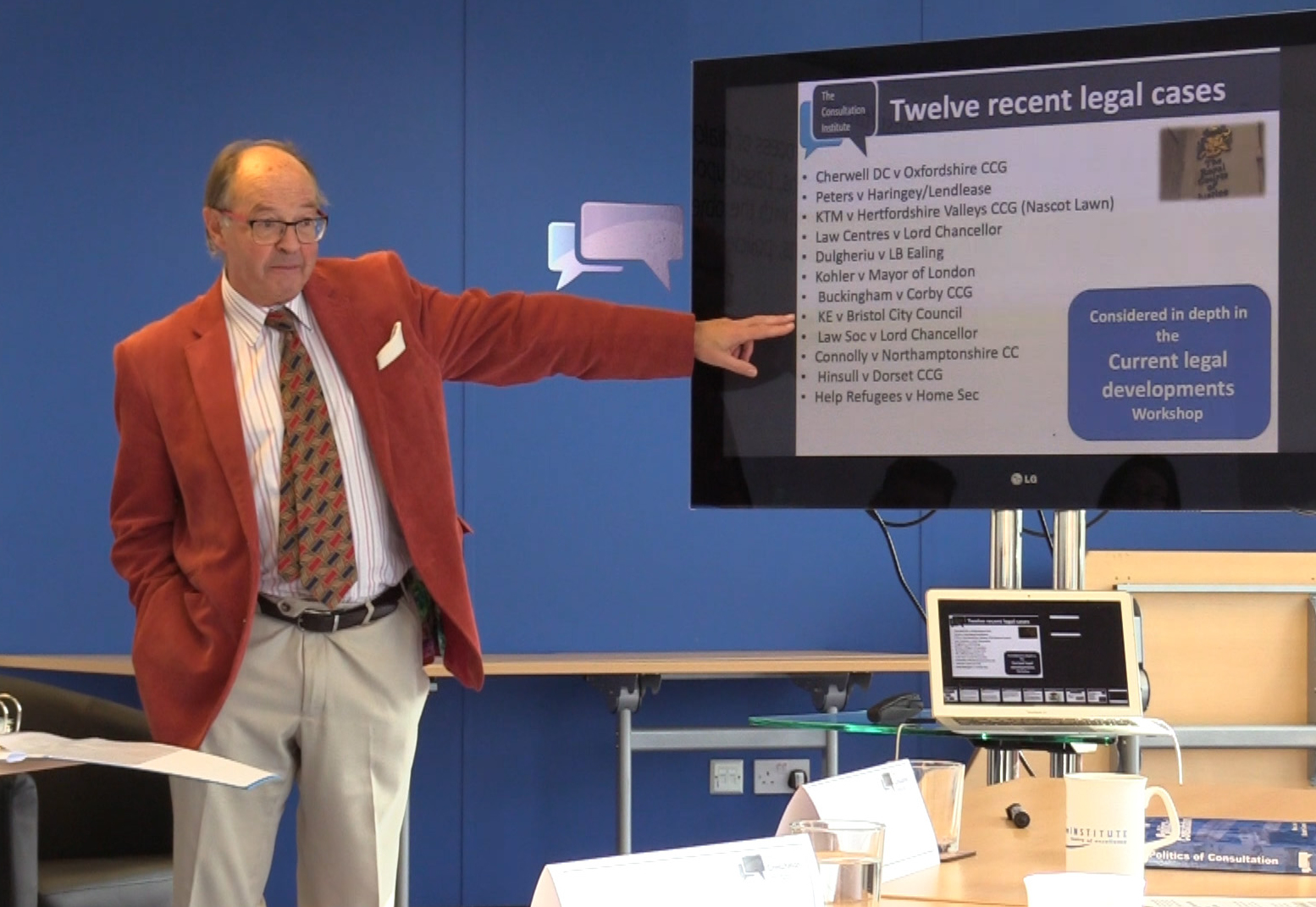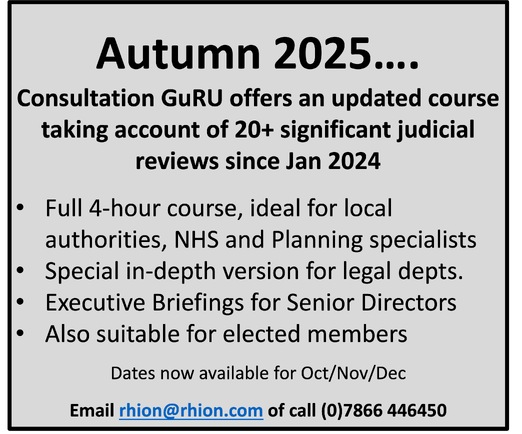Consultation Law
There is no textbook on the
Law of Consultation!
In fact, the term only emerged following Rhion's collation of the various strands of law that impacted practitioners initiating, commissioning or undertaking public and stakeholder consultations.
 Rhion has delivered a full-day comprehensive training course of the Law of Consultation almost 140 times
Rhion has delivered a full-day comprehensive training course of the Law of Consultation almost 140 times
However, since the well-known Greenpeace case in 2007, there has been an avalanche of High Court cases as Judges have been asked to rule on a wide range of legal challenges to the lawfulness of consultations.
Rhion has published commentaries on a large number of the 200+ judgments affecting consultations and hundreds of professionals have attended training courses he has delivered alongside Elizabeth Gammell and, on occasions, Rosa Curling. As a result, key concepts such as the doctrine of legitimate expectation, the Gunning Principles, pre-determination and intelligent consideration have become familiar to many.
But the law does not stand still, and new cases continually require analysis and best practice advice needs re-appraisal.
Whilst Rhion publishes regular blogs on the more important or interesting Court cases, these are no substitute for understanding the overall legal environment.
Rhion can cost-effectively guide teams to a basic level of understanding or help those with some familiarity to appreciate the finer points and be better equipped to counter claims by campaigners or critics who allege failures to observe the rules.

Latest Consultation Law
news
- 27 Sept: A case brought against Trafford MBC on the application of its Council Tax reduction scheme has resulkted in a judgment that there was discrimination and a breach of the Public Sector Equality Duty. Discussed in the October Catch-up
- 5 Sept: Baines v North Yorkshire case on Road Traffic Regulations consultation. Discussed in the Sept Catch-up.
- 20 August: Moakes v Canterbury City Council on the denial of speaking rights to consultees. See Blog 109.
- 23 June: Possible (The 10:10 Foundation) v Secretary of State for Transport about the Government’s JetZero policy, and the exclusion of demand management measures from the consultation. See Blog 103
- 20 June: The N Ireland case of Alternative A5 Alliance where climate change provisions were not taken into account ina consultation. Discussed in the August Catch-up
- 23 May. West Dulwich Action Group v London Borough of Lambeth where a presentation by consultees was disregarded by the Council. See Blog 101
- 21 February: R (SARCP) v Stoke-on-Trent City Council. on issues affecting paying for care homes. See Blog 93
- 17 January: R (Ellen Clifford) v Secretary of State for Work and Pensions which declared the previous Government’s consultation on work capability assessments unlawful. See Blog 90
- Another Supreme Court judgment that consultation professionals need to examine is Finch v Surrey CC and in Blog 77, I have considered the implications of this important decision that affects planning applications involving significant greenhpuse gas emissions.
- It's 10 years since the Supreme Court heard the Moseley case, and we now have another important case on the Gunning Principles. The LIBERTY judgment - considered in my Blog 70 confirms the emergence of Gunning Five! To be lawful - you have to consult those most impacted ....
-
The W Midlands Police & Crime case judgment has arrived and the High Court has quashed the 'hostile takeover' of the Labour W Midlands Police & Crime Commissioner by the Conservative Mayor, Andy Street. I've just looked at Mr Justice's Swift's judgment and what is surprising is that he found the consultation unlawful because it failed to provide sufficient information about the reasons for and the consequences of the transfer of powers ( a 'Gunning Two' challenge) and NOT the alleged failure to consult at a formative stage ( 'Gunning One') or inadequate consideration ('Gunning Four'). I will need to study this closely and will publish my commentary as soon as possible.